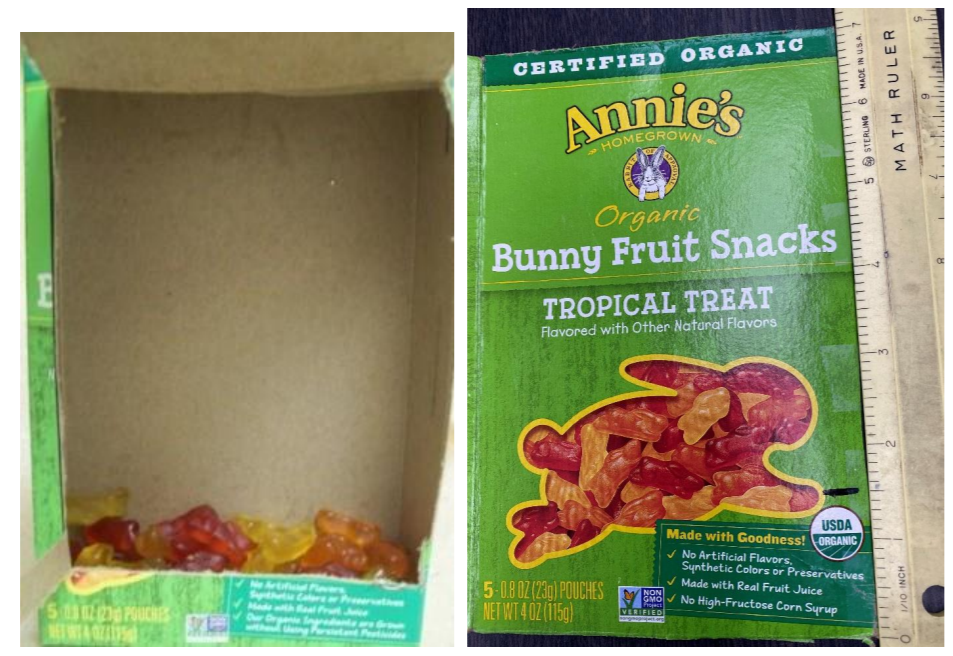Class Action: Annie’s Bunny Fruit Snacks Boxes Contain Nearly 80-Percent Slack Fill [UPDATE]
by Erin Shaak
Last Updated on January 27, 2022
Klausner v. Annie’s, Inc.
Filed: October 11, 2020 ◆§ 7:20-cv-08467
A proposed class action alleges that boxes of Annie’s Homegrown Bunny Fruit Snacks are mostly filled with empty space, unbeknownst to consumers.
Case Updates
January 27, 2022 – Lawsuit Dismissed
The judge overseeing the case detailed on this page has granted the defendant’s motion to dismiss, finding that the plaintiff lacks standing to request an order ending Annie’s allegedly illegal practices.
U.S. District Judge Philip M. Halpern held in a January 24 order that the plaintiff could not ask for injunctive relief, i.e., an order forcing Annie to change its packaging or otherwise correct its supposed wrongdoing, because she faced no threat of being harmed by the allegedly misleading packaging in the future. The judge noted that since the plaintiff had said she purchased the fruit snacks “multiple times a year for the past three years,” she “must be aware by now of the amount of slack-fill contained in a box of Fruit Snacks.”
Moreover, since the plaintiff had stated she would not purchase Annie’s fruit snacks again unless the misleading packaging is corrected, she faces no risk of being harmed again, the judge added. If Annie’s does not correct the packaging, the plaintiff will simply not buy more fruit snacks (and thus not be harmed), and if the packaging is changed, the plaintiff can buy the fruit snacks without being harmed, the order stated.
The judge went on to note that other courts have found that when packaging “clearly indicate[s]” a product’s weight, as Annie’s fruit snacks boxes do, reasonable consumers would not be misled by the amount of slack fill. Judge Halpern stated that the boxes provide “more than adequate information” for a consumer to determine how much product is contained inside.
The lawsuit has been dismissed with prejudice, with the judge finding that the plaintiff had already been given ample opportunity to amend her complaint.
Want to stay in the loop on class actions that matter to you? Sign up for ClassAction.org’s free weekly newsletter here.
A proposed class action alleges that boxes of Annie’s Homegrown Bunny Fruit Snacks are mostly filled with empty space, unbeknownst to consumers.
According to the 17-page case out of New York, defendant Annie’s, Inc. intentionally packages the “Tropical Treat” Bunny Fruit Snacks product in opaque cardboard boxes containing five individual packets of fruit snacks that cannot be viewed by consumers from the outside.
While a consumer would expect the size of the box to bear a “reasonable relationship” to the amount of product contained within, Annie’s fruit snacks boxes are constructed “so as to intentionally mislead consumers,” the suit alleges.
Per the complaint, when the fruit snacks are removed from their secondary packaging, they take up roughly 1.5 inches of the 7-inch height of the box, leaving nearly 80 percent “slack fill.”

Moreover, each of the individual packets of fruit snacks is only about half full of edible product, the suit says, leaving consumers “no way” to accurately determine the amount of fruit snacks in each box.
“The front of the package does not indicate how many individual fruit snacks are contained in the entire package or in the secondary packaging,” the complaint explains. “Though the front label lists a net weight, Plaintiff and consumers cannot know the weight of the individual fruit snacks in advance such that they would be put on notice about the small amount of product they will receive.”
According to the case, “slack fill”—i.e., the difference between the actual capacity of a container and the volume of its contents—is considered misleading if a consumer is unable to view the contents of the container.
Moreover, the suit explains, slack fill is deemed “nonfunctional” if a product’s container is filled to less than capacity for reasons other than:
- The protection of the package’s contents;
- The requirements of the machines used to package the product;
- “Unavoidable” product settling during shipping and handling; and
- The need for the package to perform a specific function, such as playing a role in food preparation or consumption.
Exceptions also apply when the food is packaged in a reusable container or when the fill level or packaging size cannot be altered due to the need to accommodate required food labeling, discourage pilfering, facilitate handling, or accommodate tamper-resistant devices.
None of the aforementioned privileges apply to Annie’s Bunny fruit snacks, the lawsuit says, arguing that the product’s packaging was designed to “deceive, mislead, and defraud” consumers.
According to the case, if consumers had known the truth about the fruit snacks boxes’ contents, they would not have purchased the product or would have paid less for it.
Get class action lawsuit news sent to your inbox – sign up for ClassAction.orgEx’s newsletter here.
Before commenting, please review our comment policy.